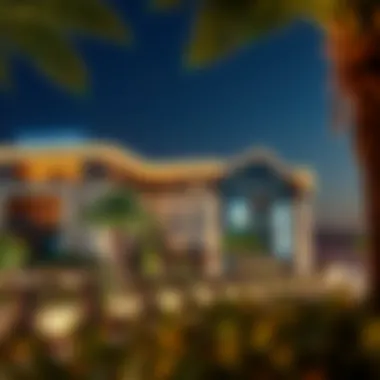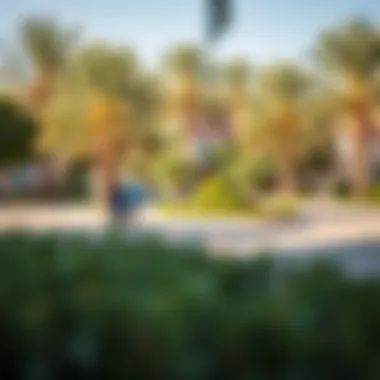Dubai Area Guide: Real Estate, Culture, and Community


Intro
Dubai, a kaleidoscope of cultures and modern innovations, continuously captivates the imagination of people across the globe. Its unique blend of traditional values and cutting-edge developments creates a vibrant tapestry that influences nearly every aspect of life here, particularly real estate. For investors, homebuyers, and expats, understanding the nuances of Dubai's neighborhoods and market trends is crucial for making informed decisions. In this guide, we aim to decipher the complexities of the Dubai area, offering deep insights into market dynamics, cultural significance, and community living.
Through this journey across various districts, we’ll highlight pivotal areas that not only boast stunning architecture and amenities but also reveal undercurrents of local traditions and lifestyle nuances. From bustling markets to serene residential enclaves, there's something to cater to every taste and financial capability. Furthermore, we want to shed light on investment prospects that could yield significant returns, transforming your engagement with this remarkable city into a fruitful endeavor.
With the property landscape rapidly evolving, staying updated on current trends and future projections is vital. Let's delve into the intricacies of the market dynamics that define this cosmopolitan hub.
Prolusion to Dubai's Geographic and Cultural Landscape
When one thinks about the allure of Dubai, it’s impossible to overlook the unique blend of geography, history, and cultural diversity that makes this city truly remarkable. Every corner of Dubai whispers tales of ancient traditions mingling with cutting-edge modernity. This section will explore how these elements come together, laying the groundwork for understanding more intricate aspects of the Dubai area.
Geography of Dubai
Dubai sits on the southeastern coast of the Persian Gulf, nestled within the United Arab Emirates. It covers a sprawling 4,114 square kilometers and is characterized by its towering skyscrapers and expansive deserts alike. The coastline, dotted with luxurious resorts and marinas, frames a city that has transformed from a humble fishing village into a thriving metropolis.
Interestingly, the geography of Dubai is not just about location; it also dictates the climate, which is classified as arid. Summers can be brutal, with temperatures soaring to 50°C (122°F). However, this doesn’t dampen the spirits of locals and tourists alike, who enjoy year-round sunshine and beautiful beaches. The strategic location has positioned Dubai as a central point in international trade, making it an essential hub for business and tourism.
Historical Significance
Diving into Dubai's history is like opening a well-aged wine; it reveals flavors that have developed over time. The emirate's roots trace back to the early 18th century, when it emerged as a small fishing and trading port. Over the years, it has been influenced by various cultures, from Persian and Ottoman to British and Indian. The discovery of oil in the 1960s was transformative, propelling Dubai onto the global stage.
In a move showcasing their foresight, the ruling family shifted focus from oil dependence and invested heavily in infrastructure, turning Dubai into a magnet for tourism and commerce. Cultural landmarks like the Dubai Museum, located in Al Fahidi Fort, offer a keen glimpse into this rich history, highlighting trade routes and local traditions that have shaped the emirate.
Cultural Diversity
Dubai is touted as a melting pot of cultures, with residents hailing from more than 200 nationalities. This unprecedented diversity fosters a unique environment where languages, cuisines, and customs coexist. It’s not uncommon for one to hear Arabic intertwined with Hindi, English, or Tagalog in daily conversations.
What’s more, this cultural vibrancy is visibly represented during events and festivals like Diwali, Eid, and the Dubai Shopping Festival. These celebrations reflect the city's respect for tradition while promoting inclusivity. Dining options span the globe—from traditional Emirati dishes to vibrant street food from India and Europe, creating a culinary map that's as varied as the city’s skyline.
"Dubai is more than a city; it's a world that cherishes the past while sprinting ahead into the future."
Real Estate Overview
In a city as dynamic as Dubai, the real estate landscape plays a pivotal role in shaping both its economy and daily life. Understanding the intricacies of this sector enables potential investors, homebuyers, and expatriates to make informed decisions that align with their goals. The real estate market in Dubai is a beacon of opportunities and challenges, influenced by various factors such as economic stability, demographic changes, and global market trends.
Not only does the real estate overview provide a lens through which one can grasp the investment and living conditions in Dubai, but it also highlights the potential returns and risks. Insight into this area enables stakeholders to better gauge which properties may serve as profitable investments and how to navigate the regulations that govern ownership.
Market Trends
As the sun rises over the skyscrapers of Dubai, the real estate market is continually evolving, mirroring global economic currents. Recently, there have been noticeable shifts in buying patterns and property demands, typically driven by both local and international investors seeking refuge in a stable market. Key trends to consider include:
- Demand for luxury properties: The upper market segment is thriving. Buyers are gravitating towards upscale developments like those found in areas such as Dubai Marina and the Downtown district. The allure of spacious layouts, modern amenities, and proximity to cultural landmarks significantly boosts their desirability.
- Sustainable living: More than just a buzzword, sustainability is becoming a priority in property development. Eco-friendly buildings are gaining traction, appealing to environmentally-conscious buyers. Developers are taking strides to incorporate green spaces and energy-efficient designs into their projects.
- Shifts in rental rates: Recent shifts have seen rental prices stabilizing after years of rapid increases. While some neighborhoods maintain high rates like Jumeirah, others might offer more competitive pricing, making them attractive to first-time renters.
Investment Hotspots


Navigating the vast landscape of Dubai’s neighborhoods can be overwhelming for newcomers. However, some areas stand out as diamonds in the rough, offering high ROI and various amenities. Top investment hotspots include:
- Dubai Marina: Known for its vibrant nightlife and marina walk, this area attracts both professionals and families looking for a lively atmosphere. The density of high-rise apartments often leads to high rental yields.
- Business Bay: As the name suggests, this area is the epicenter of commerce in Dubai. As businesses set up shop here, the demand for both commercial and residential properties is bound to rise, making it an investment worth considering.
- Jumeirah Village Circle: Often overlooked, this neighborhood has been gaining attention due to its affordability and family-friendly environment. Future developments slated for this area could potentially increase property values substantially.
Property Types and Prices
The variety in property types is one of the strengths of Dubai’s real estate market. It can cater to different lifestyles and budgets, benefiting everyone from high-flying investors to first-time homebuyers. Here’s a brief overview:
- Apartments: These range from affordable studios to luxurious penthouses. Areas like Dubai Marina offer posh options with beautiful waterfront views. Prices vary significantly depending on location; for example, a standard one-bedroom might cost around AED 1.2 million in Downtown Dubai while the same layout in Al Quoz may only set you back AED 800,000.
- Villas: Generally favored by larger families, villas are available in various communities, from lavish standalone homes to townhouses. Prices for a 4-bedroom villa in Arabian Ranches can hover around AED 3 million.
- Commercial spaces: Investing in commercial real estate, especially in Business Bay or Downtown, can yield high returns. Properties in prime locations are challenging to come by, meaning prices tend to reflect desirability.
Understanding these aspects of Dubai's property market can open up avenues that align with personal financial goals.
Key Neighborhoods and Their Characteristics
When looking to understand the vibrant essence of Dubai, key neighborhoods stand out as vital components of its appeal. These areas not only define the skyline of this dynamic city but also reflect its diverse culture, lifestyle, and real estate significance. For investors, homebuyers, expatriates, and even developers, knowing the unique characteristics of these neighborhoods helps in making informed decisions. Each neighborhood carries its own distinct charm and set of amenities that cater to various preferences and needs, making this exploration essential for anyone looking to navigate the Dubai market.
Downtown Dubai
Regarded as the heart of the city, Downtown Dubai is a melting pot of culture, luxury, and commerce. Home to iconic landmarks like the Burj Khalifa and The Dubai Mall, this area is much more than a tourist attraction; it is a lifestyle hub. The blend of high-end residential towers and vibrant retail spaces creates an unparalleled urban experience.
Living here means being at the nucleus of activity; that is convenient for professionals working in nearby business districts. Investors find it attractive not only for its rental yields but also for its potential appreciation in property value, bolstered by continuous infrastructure developments and government initiatives fostering tourism.
Key Characteristics:
- Proximity to Landmarks: Easy access to Burj Khalifa and the Fountain.
- Cultural Events: Hosts several festivals and events like Art Dubai and the Dubai Shopping Festival.
- Entertainment Options: A myriad of dining and leisure options to explore.
Dubai Marina
Dubai Marina, often referred to as the
Economic Environment
Dubai's economic environment is a tapestry woven with threads of ambition, innovation, and resiliency, making it one of the most attractive landscapes for investors and expatriates alike. This environment plays a pivotal role in shaping not only the local economy but also the global market. As the bustling heart of the UAE, Dubai's unique blend of modernity and tradition creates a fertile ground for various industries. With a focus on diversifying its income away from oil dependency, the city's growth trajectory shows remarkable potential.
Job Market Dynamics
In Dubai, the job market is a reflection of its rapid urbanization and cosmopolitan nature. The demand for skilled labor is surging as the city continues to evolve into a global hub for commerce and finance. Sectors such as technology, hospitality, and healthcare are experiencing a notable influx of opportunities, catering to the influx of both local and international talent. It’s not just a numbers game; businesses are increasingly looking for adaptable and innovative employees.
Additionally, the UAE's visa policies are designed to attract professionals from around the world. For instance, the recently introduced Golden Visa allows for long-term residency of up to ten years for professionals in specific fields, facilitating a future where talent can thrive without the constraints typically found elsewhere.
"Dubai’s job market offers prospects that can turn ambitions into reality, provided one is willing to embrace its challenges."
Business Initiatives
Dubai's government spearheads numerous initiatives aimed at fostering an entrepreneurial spirit. The Dubai Economic Agenda (D33), for example, outlines ambitious goals for economic growth over the next decade. It aims to increase the size of the economy and double the number of global companies headquartered in the emirate.


Moreover, special economic zones like Dubai Multi Commodities Centre (DMCC) and Dubai Silicon Oasis cater to specific industries, providing incentives such as tax exemptions and 100% foreign ownership. The infrastructure is built not just to accommodate, but to encourage businesses of any size to take root and flourish.
The persistence of innovation is evident in the startup scene as well. With various funding options and incubator programs available, entrepreneurs find ample resources to turn ideas into profitable ventures.
Economic Projections
Looking ahead, economic projections for Dubai are optimistic. The government’s strategic initiatives aim to boost various sectors, suggesting that the economy will likely maintain strong growth even amidst global fluctuations. Increasing tourism, bolstered by world-class events and expos such as Expo 2020, is projected to significantly contribute to the economic landscape.
Analysts forecast that sectors like technology and renewable energy will see exponential growth, considering the global shift towards sustainability. Factors like investments in artificial intelligence and data analytics promise to position Dubai as a leading player in the 21st-century economy.
Lifestyle and Community Features
The lifestyle and community features of an area can greatly influence both living experiences and property values. In the cultural melting pot that is Dubai, diverse aspects such as educational institutions, healthcare facilities, and recreational activities hold significant importance, especially for investors, expatriates, and anyone seeking to call Dubai home.
Educational Institutions
Education serves as a cornerstone for families deciding to settle in Dubai. The city has made tremendous strides in providing quality education. With options ranging from top-tier international schools to local institutions, parents can find the best fit for their children. Schools like the Dubai American Academy and Jumeirah English Speaking School are renowned for their academic excellence. In addition, there are numerous universities such as the University of Wollongong in Dubai and Heriot-Watt University, offering higher education opportunities.
"Education shapes a community's future, and Dubai is no exception."
Moreover, the emirate's commitment to education is evident in its focus on creative and technical skills, preparing students for the demands of a dynamic job market. Families should consider these educational features when evaluating neighborhoods, as proximity to good schools enhances convenience and property desirability.
Healthcare Facilities
Healthcare is paramount for anyone living in a city as vibrant as Dubai. The healthcare system here is advanced and accessible, with various choices that cater to different needs. The presence of reputable hospitals such as the American Hospital Dubai and Mediclinic City Hospital ensures that residents have access to high-quality medical care. Notably, these healthcare providers offer specialized services that could be essential, particularly for expatriates who might seek specific treatments familiar in their home countries.
Additionally, various clinics and outpatient facilities are sprinkled across the city, emphasizing preventative care and wellness. The government supports health initiatives, making it easier for everyone to maintain their health. Overall, the healthcare landscape in Dubai significantly contributes to residents' sense of security and well-being, making it a wise consideration for families and investors alike.
Leisure and Recreation
Living in Dubai comes with a panoply of leisure and recreation options, ensuring that there's never a dull moment. From sprawling parks to world-renowned shopping malls, the emirate is a treasure trove of activities that cater to all ages. Places like the Dubai Mall not only feature inconceivable shopping choices but also house attractions like the Dubai Aquarium and the Dubai Ice Rink.
The outdoors is equally inviting, with destinations such as Kite Beach and Al Barsha Park appealing to fitness enthusiasts and families. The city's layout promotes an active lifestyle, including walking paths and bicycle lanes, particularly in areas such as Dubai Marina.
Moreover, cultural experiences are woven into the fabric of leisure in Dubai. Festivals, art fairs, and local markets are common, reflecting the cultural diversity that makes the city unique. Whether it’s indulging in fine dining or exploring local cuisines at places like the Al Fahidi historical neighborhood, there’s something for everyone. Investing in property close to these vibrant activities can enhance one’s lifestyle, making it more appealing to prospective buyers.
Regulations and Laws Governing Real Estate
Understanding the regulatory landscape of Dubai’s real estate market is crucial for anyone considering investment or living arrangements in this vibrant city. The laws surrounding property ownership, tenancy rights, and recent legislative shifts hold significant weight in navigating the complexities of real estate transactions and ensuring compliance with the local legal framework. This section elaborates on these pivotal factors, offering insights into their importance and implications for various stakeholders.
Ownership Laws
In Dubai, ownership laws are shaped by a combination of Islamic principles and civil law. One primary aspect is the distinction between freehold and leasehold properties. Freehold ownership permits complete title ownership of the property and the land it stands on — an attractive option for foreign investors. In 2002, changes allowed expatriates to own freehold properties in designated areas, leading to a surge in foreign investment.
However, navigating these ownership laws requires understanding the nuances. For instance, certain areas are exclusively reserved for UAE nationals, meaning foreign buyers must ensure they are purchasing from a freehold-enabled district. Additionally, it’s essential to verify property titles and ensure that they are free of liens or other encumbrances. Investors should engage with legal experts to navigate these laws effectively, preserving their investments and avoiding legal troubles.


Rental Regulations
Rental regulations in Dubai come with their own set of rules that govern tenant-landlord relationships. These laws are designed to protect both parties, providing a framework that covers rental agreements, rental increases, and eviction processes. The Dubai Land Department has set forth the Rental Law No. 33 of 2008, specifying that landlords cannot increase rent beyond a certain percentage unless explicitly stated in the lease.
Landlords are required to register their leases officially with the Ejari system, providing legal protection and clarity for all involved. For tenants, this law offers security; for instance, in cases of rental disputes, the law provides a systematic route for resolution through rental dispute committees. Understanding these regulations is paramount for both landlords aiming for a successful rental business and tenants seeking fair treatment under the law.
Recent Legislative Changes
Legislative changes play a vital role in shaping Dubai's real estate sector. Recently, adjustments have been made to enhance transparency and investor confidence. Notably, the introduction of the Dubai Land Department's Real Estate Regulatory Agency is a significant step towards streamlined property transactions and enhanced consumer protection.
Another pivotal change is the easing of restrictions on foreign ownership of properties, promoting a more inclusive atmosphere for international buyers and investors. Recent amendments to rental laws further emphasize tenant protections, ensuring fair market practices and fostering a balanced rental environment.
These shifts reflect Dubai’s commitment to evolving its real estate landscape, continuously adapting to global trends and market demands. Investors who stay abreast of these changes can maximize their investment potential while maintaining compliance with local regulations.
"Navigating the legal waters of Dubai's real estate market requires knowledge of local regulations. Staying informed can greatly enhance your investment security."
Understanding the regulatory framework surrounding real estate in Dubai is crucial, whether for investment or homeownership. Adapting to and navigating through these laws ensures better decision-making and fosters long-term success in this dynamic market.
Future Developments in the Dubai Area
The landscape of Dubai is continually being reshaped by ambitious projects and visionary plans. Understanding these future developments is vital for anyone considering investing in real estate here, as they hold substantial implications for property values and community dynamics. In this section, we will highlight key upcoming projects and discuss how they can influence the market’s direction. The foresight of current initiatives can guide both investors and homebuyers toward making savvy decisions in a swiftly evolving environment.
Upcoming Projects
Dubai is not one to rest on its laurels. The horizon is dotted with numerous projects that promise to enhance the city’s appeal. A few standout developments include:
- Dubai Creek Tower: Anticipated to be the tallest structure in the world, this tower will redefine skylines yet again, drawing tourists and expats alike to the nearby area.
- Expo 2020 Site Transformations: The area formerly hosting Expo 2020 is undergoing a transformation into a cultural hub and an innovation district, combining leisure with a fresh wave of technology and sustainable living.
- Meydan One Mall: Envisioned as a shopping and entertainment complex, it promises a comprehensive retail experience alongside recreational options, bolstering the local economy and attracting foot traffic.
- Dubai South: This burgeoning area is designed as a new urban center, combining residential, commercial, and logistics elements, benefiting from proximity to the new Al Maktoum International Airport.
These projects are not merely buildings; they symbolize Dubai’s relentless drive to integrate cutting-edge architecture with community needs. Investing early in properties near these developments could yield fruitful returns as they instigate new demands on housing and amenities.
Impact on Property Values
As new projects take shape, they invariably affect property values. Investors need to pay careful attention to how these transformations influence the local market. Here are some factors to consider:
- Increased Demand: New developments typically stimulate interest in surrounding neighborhoods. Properties near prestigious projects often see a bump in demand, leading to potential price appreciation.
- Enhanced Infrastructure: With significant developments come improved infrastructure—think transportation, utilities, and public services. Such enhancements can increase a property’s desirability, thus affecting its market value positively.
- Shift in Community Dynamics: Each new project tends to attract a unique demographic, which can shift the cultural and economic landscape of an area. For instance, a new mall or entertainment center may draw in families, therefore increasing the need for family-sized homes nearby.
It's essential for investors to keep their ear to the ground. Being aware of emerging developments can mean the difference between a great investment and a missed opportunity.
Finale and Final Thoughts
Reflecting on the intricacies and vibrancy of Dubai’s landscape reveals much about the city’s unmatched allure. As showcased throughout this article, Dubai is a kaleidoscope of opportunities and experiences, making it a haven for investors, expatriates, and those eager to tap into its growth dynamics.
Summarizing Key Insights
Dubai is not just famous for its towering skyscrapers. It's a blend of history, modernity, and cultural diversity that shapes the fabric of daily life here. Potential buyers and investors can benefit from understanding critical insights such as market trends, neighborhood characteristics, and the evolving regulatory landscape. For instance, trends in Downtown Dubai are vastly different from those found in Dubai Marina, differing not only in property prices but also in lifestyle offerings, amenities, and community engagement.
Additionally, upcoming developments and initiatives continue to redefine the Dubai experience, with projects aimed at enhancing the quality of life, economic sustainability, and global connectivity. It's noteworthy that the area’s historical significance combines with a forward-looking economic environment—this duality is crucial for any informed decision-making.
Importance of Informed Decision Making
In the ever-evolving real estate landscape of Dubai, staying informed is paramount for anyone considering investment or relocation. The importance of data-driven choices cannot be overstated. Forum discussions, such as those found on platforms like reddit.com and insights from real estate portals, provide invaluable perspectives that help paint a clearer picture for potential buyers.
Making informed decisions involves weighing numerous factors, be it economic projections, neighborhood dynamics, or the regulations that dictate property ownership and rental agreements. By understanding the nuances of the market and aligning them with personal goals or investment strategies, one can navigate the complexities of Dubai’s real estate scene with confidence and precision.















